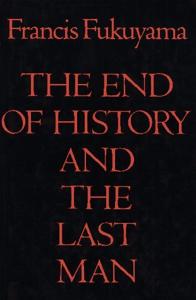
Want to learn the ideas in The End Of History And The Last Man better than ever? Read the world’s #1 book summary of The End Of History And The Last Man by Francis Fukuyama here.
Read a brief 1-Page Summary or watch video summaries curated by our expert team. Note: this book guide is not affiliated with or endorsed by the publisher or author, and we always encourage you to purchase and read the full book.
Video Summaries of The End Of History And The Last Man
We’ve scoured the Internet for the very best videos on The End Of History And The Last Man, from high-quality videos summaries to interviews or commentary by Francis Fukuyama.
1-Page Summary of The End Of History And The Last Man
Overall Summary
The End of History and the Last Man is a book written by political scientist Francis Fukuyama. It’s based on his 1989 essay, “The End of History?”, which was published in the international affairs magazine The National Interest. In that work, he argued that democracy has triumphed over other forms of government and is now the end point of humanity’s sociocultural evolution. However, critics such as Karl Marx have argued that current democracies are not stable and will be replaced by socialist states with more control over their economies. Exploring themes like democracy versus dictatorship, social evolution, and human behavior patterns, The End of History and the Last Man was one of Fukuyama’s most controversial works because it supported democratic peace theory while being criticized for its faulty arguments about liberal democracy.
The End of History and the Last Man is a book by Francis Fukuyama that argues that liberal democracy has triumphed over communism and other ideologies. As such, there are no more challengers to these systems of government, which means they will remain stable for the foreseeable future. There’s also been an end to history because all previous forms of government have failed at some point or another; therefore, liberal democracy has reached its final form.
Fukuyama examines Marx’s theory that communism would collapse and the state would dissolve, but believes that this hasn’t happened. The only remaining communist states are small, isolated nations who have chosen to cut themselves off from the world in order to maintain communism. However, he does offer a concession to critics of capitalism by exploring the possibility that while it is stable, it may not be entirely satisfactory. Exploring Nietzsche on similar topics, he looks at whether making money or attaining office will be sufficient challenges for people in society if there are no more historical events like wars or social movements.
Fukuyama then discusses how liberal democracy and free market capitalism came to be the only sustainable system of government. He argues that it was science that made this possible, as well as the industrial revolution. With science, society could progress in a more orderly fashion instead of being subject to random events like floods or plagues. People resisted at first, but with time they realized that technology would make life better for everyone. Science and industry gave people what they needed: modernity. Fukuyama says no other form of government has survived except for liberal democracy because it’s the most compatible with modern times; nothing else can sustain itself without falling apart eventually. Free market capitalism is necessary because there are too many factors involved in running an economy successfully for governments to do so on their own; private industries have to help them out by providing incentives for exploration and new ideas through competition. ”
American political scientist, economist and author Francis Fukuyama is best known for The End of History and the Last Man. He’s a senior fellow at the Freeman Spogli Institute for International Studies, as well as a Mosbacher Director of the Center on Democracy, Development, and the Rule of Law at Stanford University. He also cofounded The American Interest journal.





